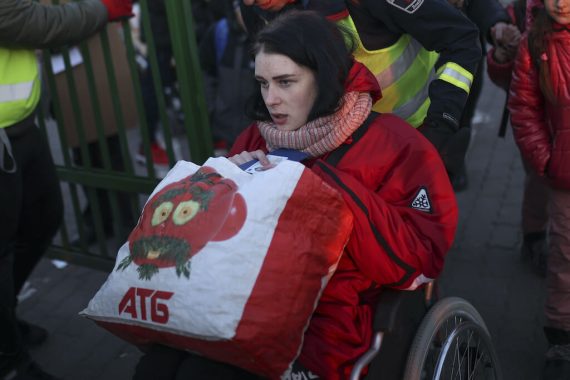Wars affect everyone differently: men are forced to leave their loved ones behind to fight in a battle over which they have no say or control; women are left to care for non-combatants while becoming further vulnerable to dangers; and children are affected in ways we cannot even fathom. However, some groups face additional difficulties such as disabled individuals which comprise 16% of the population in armed conflicts globally.
For example, if they have no visible disabilities, young men in Ukraine who are usually unfit to fight in the war have been forced to take part in the recent Ukraine and Russian aggression. They do so even if they require constant medical care or have a psychological disorder that may have triggering effects. Women and girls with disabilities, physical or mental, are unable to flee violence, and many more become vulnerable to human rights violations, violence, and abuse. These individuals already face severe adversities, to which are added emerging global complications such as climate change and the global health crisis (triggered by COVID-19).
We know wars can cause casualties that can end with a life-long disability such as losing limbs or suffering from PTSD. However, some have been suffering already prior to the war, making it extremely difficult for them and their loved ones to fight, escape, or sometimes even seek shelter. Thus, their caregivers face grave dilemmas: should they flee to a safer country despite the dangers ahead and the possible lack of necessary care and accessibility, or should they stay and continue to care for those that need them in the limited “safety” of their homes? Each decision is not without its consequences.
What does the universal law on persons with disabilities say about armed conflicts?
According to Article 11 of the United Nations Convention on the Rights of Persons with Disabilities (CRPD) adopted in 2006:
States Parties shall take, in accordance with their obligations under international law, including international humanitarian law and international human rights law, all necessary measures to ensure the protection and safety of persons with disabilities in situations of risk, including situations of armed conflict, humanitarian emergencies and the occurrence of natural disasters.
This article was one of the grounds of the open letter by the EDF (European Disability Forum), which called on all parties to ensure the protection and safety of disabled individuals in Ukraine.
In 2019, the United Nations Security Council adopted Resolution 2475 on the situation of persons with disabilities in armed conflict, recognizing the impact of armed conflict on persons with disabilities and highlighting the obligations of all member states.
Important issues
It is essential to highlight that in a world that has long witnessed numerous wars, these resolutions are relatively new and are yet to be adequately applied. An in-depth case study titled “Unshielded, Unseen: The Implementation of UNSC Resolution 2475 on the Protection of Persons with Disabilities in Armed Conflict in Yemen” is a case in point.
The study revealed that being a signatory to the CRPD does not guarantee the implementation of these protections—far from it. The efforts to promote the right of disabled individuals have ceased since the commencement of hostilities in Yemen in 2015. Moreover, nearly 81% of disabled people cannot access humanitarian services and are excluded from internally displaced sites.
Recommended
According to a report submitted to the UN Special Rapporteur on the Rights of Persons with Disabilities in the context of armed conflict by the Human Rights Watch, it was found that disabled individuals were at higher risk during armed clashes. They had difficulties escaping and lacked access to assistive devices (crutches, audio-visual aid devices, wheelchairs, etc.) and basic services (food, sanitation, health care, etc.). They were also more vulnerable to mental health impacts and psychological distress.
A similar case is now evident in the Russia-Ukraine war. Despite the joint condemnation of Russia and support for Ukraine among the international community, the humanitarian response currently lacks inclusivity and is inaccessible to many. According to the EDF, there are currently 2.7 million recorded disabled individuals in Ukraine who require services on all levels, including care, access, safety, and evacuation. Those that cannot flee have no choice but to stay; however, they require safe access to health services and care, which is extremely difficult in times of war.
Safety precautions must be provided in accessible methods for those with limited sight or hearing. People with mental disabilities or traumas may find it extremely difficult and triggering to stay in shelters which are usually underground and crowded. Low hygiene conditions may also be a triggering factor for people with chronic illnesses or OCD.
For those who wish to flee, the escape routes are not usually disabled-friendly, starting from the lack of inclusive access to critical information about safety and evacuation to uneven roads and lack of electricity that make it extremely difficult for those traveling with aid equipment.
What could be done?
The devastation of war affects everyone, but it becomes harsher and more taxing for some people because they are not included in the disaster response. Unfortunately, during times of war, the “Every man for himself” attitude comes to the foreground, putting vulnerable people in further jeopardy. This explains why large humanitarian organizations must communicate with the disabled community or specific organizations that represent disabled individuals to set up a more inclusive response strategy and emergency plans during crises and humanitarian responses.
The Convention on the Rights of Persons with Disabilities and Resolution 2475 must be followed by all states. The convention must be followed up with implementation, which includes protection, access to information protocols (via braille, visual-audio aid, etc.), and basic services (hygiene products, health care, assistance, transportation, etc.). All of the above applies to those who flee from the war and those who stay.
The wrath of war is difficult to handle. We must all ensure that access to humanitarian aid and the right to flee or be safe is shared equally and fairly, and that no person is ever left behind.
Note: Unless otherwise indicated, this op-ed uses the term “disabled individual” to describe all types of disabilities (mental, physical, psychological, chronic illnesses, etc.)





